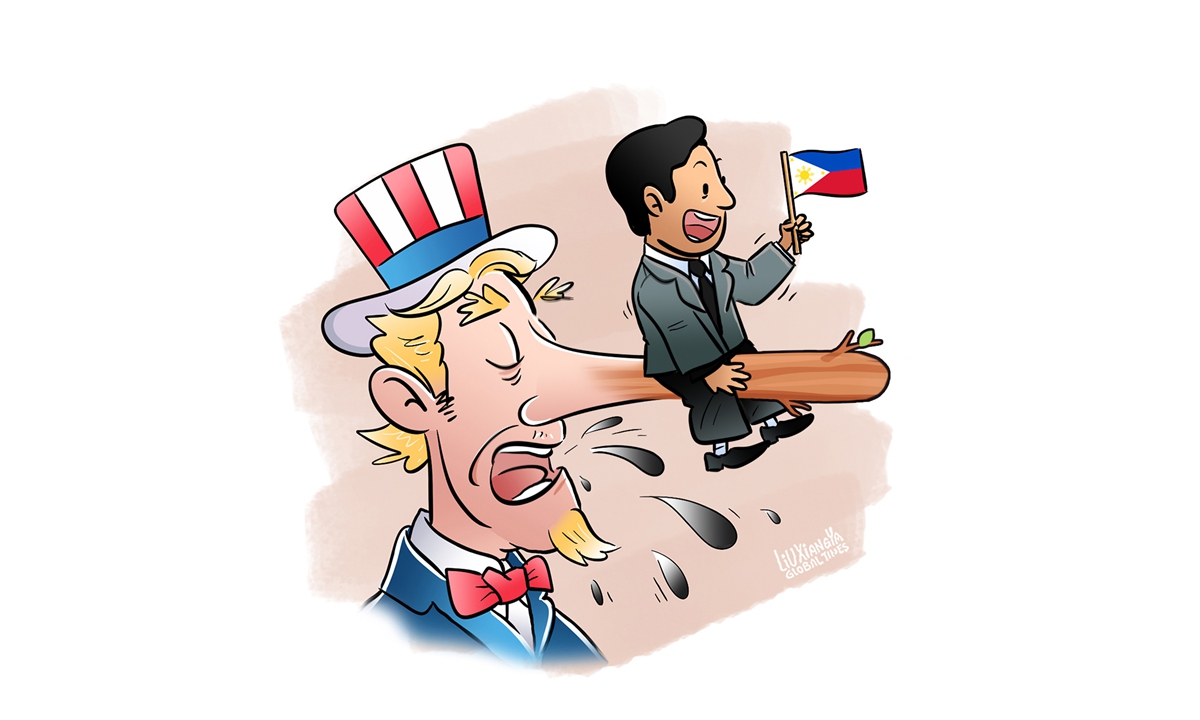
Illustration: Liu Xiangya/GT
US Secretary of Defense Pete Hegseth is scheduled to visit the Philippines from Friday to Saturday. The Philippines has unusually become the first stop in the Asia-Pacific for the US defense chief's inaugural visit, significantly emboldening the country's provocations against China.
On Monday, Philippine Defense Secretary Gilberto Teodoro once again acted as a mouthpiece for smearing China, asserting that China's claims in the South China Sea are "the biggest fiction and lie" that no Southeast Asian country would accept. On the same day, around 5,000 Philippine and US Army troops began three weeks of joint military exercise.
"Considering the increasing concerns of traditional US allies about the uncertainty of US policies, the US' recent approach to the Philippines aims to provide a certain level of reassurance," military expert Zhang Junshe told the Global Times. However, this "reassurance" has instead made the Philippines overly elated, triggering a wave of self-congratulation within the country. Jose Manuel Romualdez, the Philippine ambassador to the US, called the visit "a strong message to China on solid bilateral relations" between the US and the Philippines.
In an interview with the Philippine media outlet Super Radyo DZBB, Romualdez expressed even greater expectations for US assistance, stating that the Philippines should "take advantage of our situation now that we're on the radar screen of the US" to make its Armed Forces modernized and ask the US to help with its economy.
The Philippines' self-perception of "enhanced status," seeking both American weapons and financial resources, reveals an unrealistic strategic miscalculation by Manila's decision makers.
The Philippines hopes to modernize its armed forces, which requires substantial funds, technology and military equipment from the US. However, the "America First" policy of the new administration is essentially transactional diplomacy, where support for allies is more aligned with US interests rather than purely military or economic aid. "Under the new administration, the US is unlikely to increase military aid to the Philippines. It may even reduce it, and encourage the Philippines to buy US-made weapons and equipment with its own funds," Song Zhongping, a Chinese military affairs expert, told the Global Times.
The Philippines expects the US to help develop its economy, but the new administration is currently more focused on bringing manufacturing back to the US rather than foreign investment. Expecting the US to help the Philippines develop its economy is unrealistic. The economic relationship between the US and the Philippines has long been unequal, with Washington's focus being more on military cooperation and security affairs rather than economic development, resulting in limited investment. Even if the Philippines receives some aid from the US, it is unlikely to fundamentally change its economic structure and may even find itself in a more passive position in future international negotiations due to excessive dependence on the US.
By strengthening its so-called alliances and partnerships, the US has demonstrated various forms of "support" for the Philippines. However, while this creates the illusion of "strategic importance" for the Philippines on the surface, it actually pushes the country to the forefront of great-power rivalry.
The US' current military support for the Philippines is notably instrumental, aimed at better serving its "Indo-Pacific Strategy" and demonstrating its strategic positioning against China. From Washington's perspective, this "low-cost, high-impact" approach allows the US to maintain its strategic advantage in the region while shifting risks to regional allies.
If Manila fails to recognize the unequal nature of this relationship, excessively relying on US support, which is fraught with uncertainty, and even adopting a more aggressive stance on the South China Sea dispute, it will only place itself in a more dangerous situation. The pursuit of a modernized military may develop into a colonial tendency.




